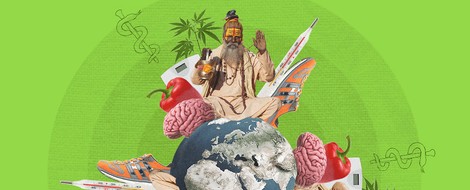Your podcast discovery platform
Curious minds select the most fascinating podcasts from around the world. Discover hand-piqd audio recommendations on your favorite topics.

piqer for: Global finds Health and Sanity Doing Good
Bangalore-based Rashmi Vasudeva's journalism has appeared in many Indian and international publications over the past decade. A features writer with over nine years of experience heading a health and fitness supplement in a mainstream Indian newspaper, her niche areas include health, wellness, fitness, food, nutrition and Indian classical Arts.
Her articles have appeared in various publications including Mint-Wall Street Journal, The Hindu, Deccan Herald (mainstream South Indian newspaper), Smart Life (Health magazine from the Malayala Manorama Group of publications), YourStory (India's media technology platform for entrepreneurs), Avantika (a noir arts and theatre magazine), ZDF (a German public broadcasting company) and others.
In 2006, she was awarded the British Print-Chevening scholarship to pursue a short-term course in new-age journalism at the University of Westminster, U.K. With a double Masters in Globalisation and Media Studies from Aarhus Universitet (Denmark), University of Amsterdam and Swansea University in Wales, U.K., she has also dabbled in academics, travel writing and socio-cultural studies. Mother to a frisky toddler, she hums 'wheels on the bus' while working and keeps a beady eye on the aforementioned toddler's antics.
Google's Ambitious Health Study: Hello Better Health, Goodbye Privacy?
Google knows who your friends are, who you follow, what photos you take and what you search on the internet. It might soon know about your heartbeat, urine and genes too.
In their own words, now that they have mapped the world, they would like to “map human health” with the super-ambitious, long-term and large-scale health study Project Baseline. The 10,000-people study by Verily (which is part of Alphabet that owns Google) is out to collect unique health histories, genetics and “way of life” (whatever that entails) to better treat diseases. So far so good.
This article is a good starting point to look at this ostensibly noble story from other angles. It tries to understand why Google's “invasive, deep, new health study” might no doubt be important but is also scary. It raises questions familiar to those dealing with Google and Facebook's everyday astuteness — who benefits from this study? You and me? Or the people actually collecting the data?
Undoubtedly, large-scale studies have helped solve many great health mysteries. But such studies are supposed to make the data anonymous. Anonymity is hard to achieve nowadays because of overlaps with voter and census data. As the author says, this ‘de-anonymization’ is good for those looking to monetize this data. With Baseline too, he raises suspicions about the eventual sale of data to academic and commercial clients — especially because you will sign into Baseline with your Google account.
Privacy is certainly a worrying issue. But is it okay to give it up for the cause of the greater public good? As Sam Gambhir, one of the project designers says, it will be a goldmine of data on blood, genome, urine, heart, sleep and state of mind. No one has looked this deep into 10,000 individuals.
But Google is a commercial entity and will look for some (any) profit. Many of us will still get on board because we are the people whose health might improve if Baseline works. We are, as the author concludes, customer and product both.
